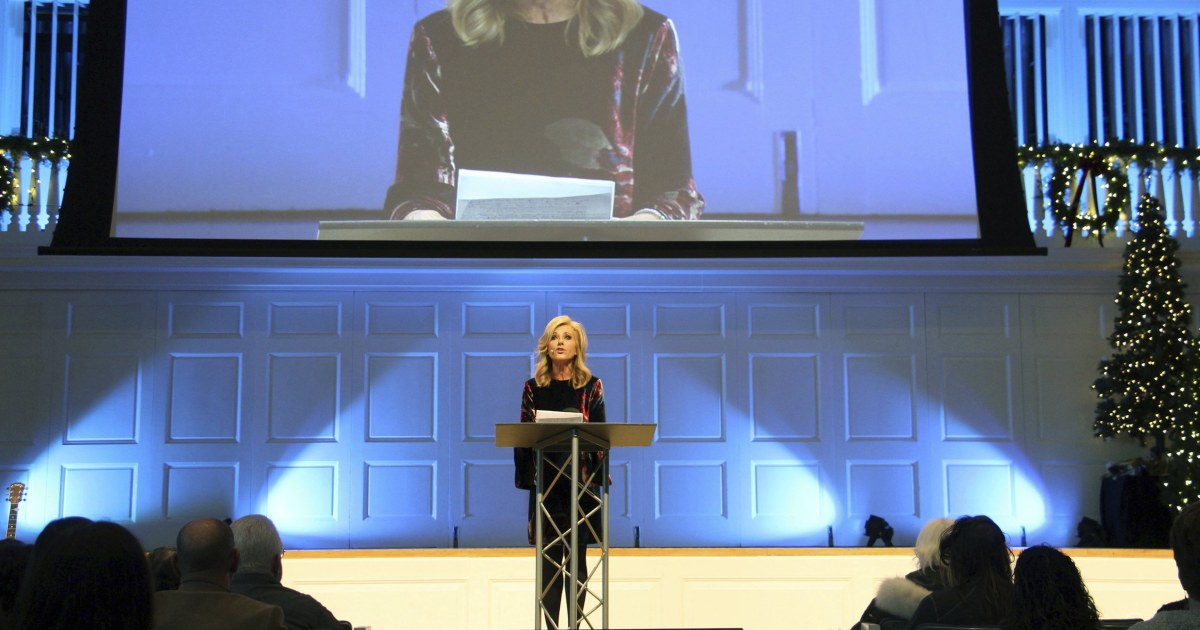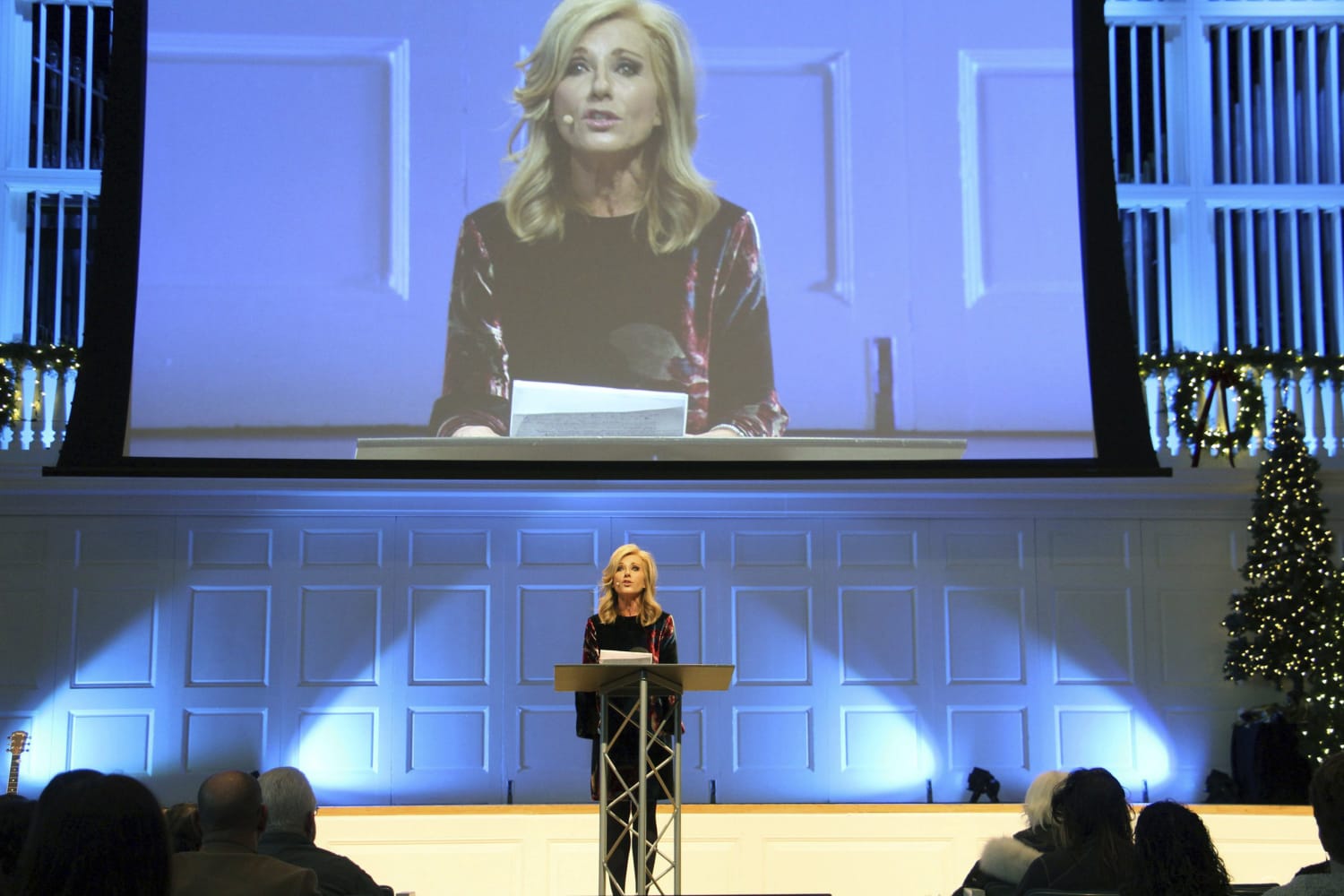
Celebrity evangelical Bible teacher Beth Moore’s recent split with the Southern Baptist Convention is the latest in a string of public departures that underscore issues of gender, race and political division within the denomination, some former and current members say.
“I love so many Southern Baptist people, so many Southern Baptist churches, but I don’t identify with some of the things in our heritage that haven’t remained in the past,” Moore told Religion News Service in an interview published March 9.
For years, Moore, 63, has spoken out against “sins of nationalism, racism, sexism, hatred” within parts of the Southern Baptist Convention, or SBC, the largest Protestant denomination in the United States, with over 47,000 affiliated churches.
Moore, a bestselling author with almost a million Twitter followers who gives energetic lessons about the Bible and her personal testimony to packed stadiums, said she had been talked down to, insulted and sexually harassed by men within the denomination for years. But it was ultimately American evangelicalism’s overwhelming support for Donald Trump and what she called “Christian nationalism” that alienated her from the SBC, she said.
The convention’s senior leader expressed sorrow over her announcement.
“I am grieved anytime someone who believes in the inerrant Scripture, shares our values and desires to cooperate says that they do not feel at home in our convention,” SBC President J.D. Greear tweeted March 10, adding that he hoped Southern Baptists would “lament, pray” in response to the news and focus on future unity.
Some young women said Moore’s departure resonated with their own experiences leaving the SBC over sexism.
“This legendary woman of faith essentially had to beg men of the convention to take her seriously,” said Auburn Powell, a Ph.D. student in Old Testament theology at Wheaton College in Wheaton, Illinois.
Powell, 27, had looked to Moore as a model of how to make a career of teaching the Bible within the Southern Baptist tradition. But after college, she found that few SBC-affiliated churches welcomed women in teaching roles, and she said she ultimately “felt forced” to look for opportunities outside the denomination.
“As a woman called by God to teach the Bible, its languages and theology, how could I stay in a denomination that doesn’t recognize this God-given vocation and would not let me teach simply because I’m female? That’s the definition of shooting yourself in the foot,” Powell said.
Her experience is part of a greater debate within the SBC about the interpretation of the denomination’s beliefs about the roles of men and women.
According to the Southern Baptist Convention’s doctrine, while men and women have equal inherent worth, God created men to hold positions of authority over women.
Moore treads that line by carefully describing herself as a “teacher” who “minister[s] to women,” rather than as a preacher. But both men and women watch her conference speeches and guest sermons, and she has said that despite having “no personal aspirations to preach … if men showed up in my class, I did not throw them out. I taught.”
Many church leaders firmly believe that Moore’s willingness to teach men defies Baptist doctrine, including Tom Buck, senior pastor at First Baptist Church in Lindale, Texas.
“She’s physically left or openly announced she’s left the SBC, but when it comes to the Baptist Faith and Message, she departed a while back,” Buck said, referring to the convention’s formal statement of faith.
Moore is not the first prominent Southern Baptist to have publicly parted ways with the SBC.
In December, several well-known Black pastors broke with the Southern Baptist Convention after its seminary presidents, who are white, released a statement saying critical race theory, an academic concept that racism is deeply rooted in U.S. institutions to the benefit of white people, was “incompatible with the Baptist Faith and Message.”
At the end of a grueling year of racial reckoning for American society, some Black leaders saw the statement as ill-judged at best and, at worst, as a callback to the overwhelmingly white Southern Baptist Convention’s founding in 1845 in defense of missionaries who owned enslaved people.
“It was the most tone-deaf statement they could have made,” said William Dwight McKissic, senior pastor of Cornerstone Baptist Church in Arlington, Texas, which is a member of both the Southern Baptist Convention and the National Baptist Convention, the largest Black denomination in the U.S.
Over 400 Southern Baptist leaders replied, criticizing those in the denomination who “deny the existence of systemic injustice as a reality.”
“Many who recognize systemic injustices are labeled as ‘Marxists,’ ‘Liberals,’ and ‘Critical Race Theorists,’ even though they are theologically orthodox and believe in the total sufficiency of Scripture,” they wrote.
“Future cooperation remains possible and preferred if we commit to biblical justice and repentance in the SBC. However, if these commitments are not upheld, then it will signal to many in the SBC that cooperation has already ceased to exist,” the statement warned.
The Southern Baptist Convention senior leadership has also faced a reckoning over how it has handled sexual abuse within member churches.
The long-time advocacy of Moore, a survivor of childhood sexual abuse, gained particular significance in 2018, when several senior leaders of the Southern Baptist Convention were accused of sexual abuse or misconduct or of mishandling allegations against others. A 2019 investigation by the Houston Chronicle and the San Antonio Express News found that over 200 Southern Baptist leaders and volunteers had been convicted of or had taken plea deals for sex crimes over the previous two decades.
In a resolution condemning sexual abuse that it adopted at its annual meeting that year, the SBC apologized “for failing to cultivate a culture of protection for those in Southern Baptist churches and institutions who have been sexually abused.”
Rachael Denhollander said she was pushed out of her Southern Baptist church when she most needed support: just as she became the first person to speak publicly against former USA Gymnastics doctor Larry Nassar.
Denhollander and her husband had repeatedly raised concerns with leaders of Immanuel Baptist Church in Louisville, Kentucky, over its relationship with another group of churches alleged to have mishandled and covered up sexual abuse and domestic violence among some of its congregations and pastors.
The Denhollanders have since received an apology from their former church. Even though she no longer attends a Southern Baptist church, Denhollander has worked with the SBC’s public policy arm to design the Caring Well Initiative, a resource for churches on how to spot signs of abuse and support survivors.
The reception has not always been positive. She said some pastors call ahead to “warn” others about her work.
“I have very little hope that the contingent of the SBC that villainizes abuse and justice advocates is going to change,” Denhollander, 36, said over the phone from her home in Louisville. “I doubt Beth leaving is going to stop attacks. I’m not part of the SBC, and it hasn’t stopped them from attacking me.”
Southern Baptist leaders’ support of Trump over the past five years has proven hugely divisive within the denomination, said Kate Bowler, an associate professor of the history of Christianity in North America at Duke Divinity School.
“For people like Beth Moore and so many other female teachers I spoke to, having to remain silent about a presidential candidate-turned-president with multiple accusations of sexual assault, thrice married, to have to render him a spiritually respectable figure — not just for men but for women — was a tough pill to swallow,” she said.
Bowler said many are leaving the SBC because they have lost faith in its leadership.
“I don’t think teachers like Beth Moore left the SBC. … I think the leaders of the SBC left her,” she said.
As Southern Baptist churches grapple to find their place in social movements like #MeToo and Black Lives Matter, there is hope that they could learn and grow in spite of departures like Moore’s, said Chris Davis, pastor of Groveton Baptist Church in Alexandria, Virginia.
“To the degree that we’re willing to listen to and learn from our sisters and listen to people of color while holding fast to our doctrinal convictions … I believe the possibility remains for followers of Jesus to feel at home in the Southern Baptist Convention,” he said.
Source: | This article originally belongs to Nbcnews.com










